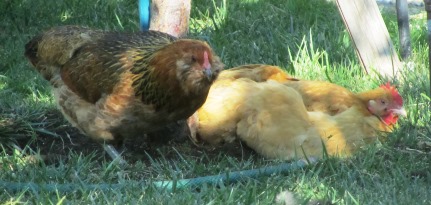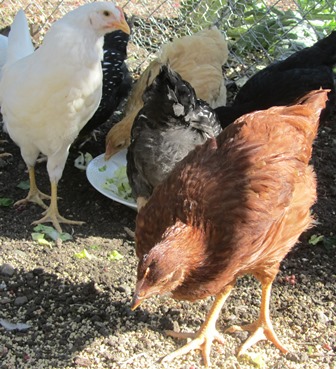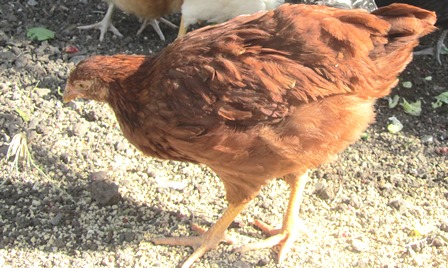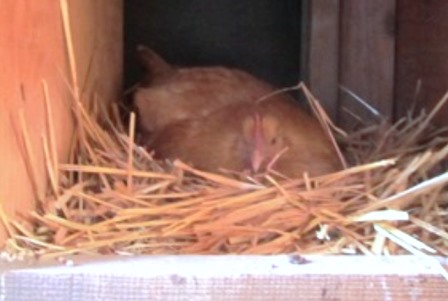Buffo’s Gone Broody
My Buff Orpington hen won’t leave the nest. I’ve taken to putting out a bowl of crumbles and a canister of water so she’ll have nourishment while she sits on a a pile of eggs.
I’m beginning to think that with her this broody period is going to happen about every six months–at least that’s been the case so far.
Ruby the Rhode Island Red, the Wyandotte sisters, the Black Sex Link, and my two white leghorns are being de-laned into the two other boxes. And I have to practically crawl into the chicken house to reach the last nest box to retrieve their eggs.
Our town doesn’t permit us to keep roosters. Ergo, those eggs that Buffo is trying to hatch will have to be tossed at the end of her broody period. They’re not fertile and will never hatch. But I haven’t the heart to tell her.
* * *
If you enjoy reading about farmette life, check out my cozy mystery novel series from Kensington Publishing, New York. The books feature a farmette milieu, farm sayings, tips, and facts as well as delicious recipes to try. The books are available from online sources such as Amazon, Barnes & Noble, Walmart and others as well as traditional bookstores everywhere.
Why You Should Never Leave the Farmhouse Door Open
I unlatched the hen house door to let the birds out for the day. Then I filled water basins for my chickens, honeybees, and farmette wildlife. Finally, with chores done, I returned to the farmhouse to work on my new book.
Lost in a tense winter scene for novel number three, I wrote until I heard the chickens cackling as they do when they lay an egg or are frustrated because they can’t get the nesting box already occupied by another hen. And of late, that happens often because one of my Wyandotte chickens has gone broody. She’s sitting on two dozen eggs and it’s futile since we don’t have a rooster. Those eggs will never hatch.
As the cackle grew louder. I stopped typing to peer out the window next to my desk. Nothing seemed out of the ordinary, but on the off chance that a skunk, fox, chicken hawk, or other predator had invaded the yard or the hen house, I got up. I had to check.
By now the cackle had become deafening. I thought the chicken might be at the back door. As I turned from my computer to walk down the hall past my bedroom, I saw my Rhode Island Red directly in my path. Her cackle could wake the dead. So why was she making such a ruckus.
Then I saw it–a dollop of chicken poop on my new hardwood floor. She must have known I’d be furious. And she’d been trying to tell me something. I swooped her up and carried her outside, making a mental note to always check the door on the farmhouse. My office is no place for a chicken.
Help–There’s a Chicken on My Back
Collecting eggs, I bent over into the chicken house. Suddenly, a large chicken land on my back and start talking to me in her chicken language. I immediately knew it was my Rhode Island Red. She follows me everywhere.
It would have made a cute picture, but here’s the thing: you don’t want chickens tarrying too long in one place because they are famous for frequent and abundant droppings.
The Rhody is the most personable chicken in my flock and the one I handled the least when I cared for the flock of baby chicks in a tub in my kitchen. However, the chicken I handled the most from my tub of baby chicks was the yellow Buff Orpington, and today she’s difficult with the other hens and its also the first to have gone broody.
As I do chores around the farmette, the Rhody keeps me company. When I go inside to work in my office on my writing projects, she often hangs out under my office window, clucking or making an number of various chicken sounds. She also responds to my voice when I call out her. If I had it to do over again, I’d have a whole flock of Rhode Island Reds, just for the personality.
Big, Blonde Buff-O Goes on the Attack
The yellow-colored Buff Orpington hen seemed so cute when she was all down and a day old.
But six months have passed, the Buff-O has feathered out and gone broody. Today, she showed me a nasty-tempered, cranky hen, with ruffled feathers who will stop at nothing to hatch the clutch of eggs she’s sitting on.
The problem is that some of those eggs in the nesting box aren’t hers, and they’re all unfertilized since we have no rooster.

From left to right: Furry Face, the Ameracuana, and Buff-O, the Buff Orpington, when they used to sun themselves together
Buff-O has been sitting on the clutch of eggs for almost three weeks now, barely leaving to eat or drink. But today, she exited the hen house to take dirt bath–that’s how chickens clean themselves. Toss on the dirt, roll in it, then get up and shake like a dog, flinging the dirt in all directions as far as possible.
Before the fight started, all nine of my hens were foraging on our property, except for Buff-O and the shy Ameracauna with the furry face. The latter was in the chicken run, scratching the dirt, minding her own business.
I saw Buff-O walk over and lunge at Furry Face in attack mode. She used her beak to viciously peck Furry Face’s neck and her clawed toes to tear at the poor shy chicken’s back. She seemed more rooster than hen.
I ran for the hose and separated the two with a spray of water. Then, with both out of chicken run and into the yard, I gathered up all those unfertile, soon-to-be-rotten eggs that Buff-O has been trying in vain to hatch, and headed toward the garbage can.
But apparently, tossing those eggs changed nothing. Buff-O is back in the hen house on the nest–albeit, a different nesting box than before. But the straw in the original nesting box is still warm. It’s being occupied by Furry Face. Go figure!
A Broody Hen, A Clutch of Eggs, and No Rooster
My little yellow Buff Orpington {as yet unnamed) has gone broody. I didn’t know this behavior could happen so early in her young life. At 20 weeks, she’s only just started laying eggs. Now all she wants to do is sit on them.
Like an expectant mother, she contentedly sits, apparently anticipating the arrival of her chicklets (in 21 days). I don’t have the heart to tell her that she needed a rendezvous with a rooster to get eggs that will hatch. And, in case she hasn’t noticed, we don’t have a rooster.
She’s become a fixture on the nesting box, forcing the other chickens to lay their eggs in the other two. Buff O. sits on the eggs (who knows how many are under her) with a glazed look in her eyes. If I go near her nesting box, she puffs up and ruffles her feathers like an attack chicken.
She must leave the nest to eat, drink, and poop . . . . but I haven’t witnessed it, so I have put containers of food and water near the nest. I don’t want her losing weight or getting sick during her sit-in.
At first, sensing that she was behaving strangely and fearful that something be wrong with her, I began searching the Internet. Apparently some breeds like Silkies, and Cochins have a tendency to go broody. And, they can go broody more than once during the year. See, http://blog.mypetchicken.com/2012/02/01/what-is-a-broody-hen.
Apparently, dictated by their biology, laying hens decide to sit on a clutch of eggs, even rolling other chickens’ eggs under them if there aren’t enough. The laying hen will rotate her body to redirect heat evenly over the eggs or pluck out her own chest feathers to create more warmth and moisture for the eggs. In the case of my hen, I’m trying to imagine a bare-chested chicken sitting on a clutch of eggs that will never hatch.
Broody hens will even talk to the eggs (and the little chicks growing inside). It’s mommy business they are attending to. However, once a hen has gone broody, she will stop laying. And as for the mommy business, I have no idea how my Buff Orpington will figure out that those eggs she’s so carefully guarding . . . well, they’re just eggs.
 Facebook
Facebook Goodreads
Goodreads LinkedIn
LinkedIn Meera Lester
Meera Lester Twitter
Twitter










